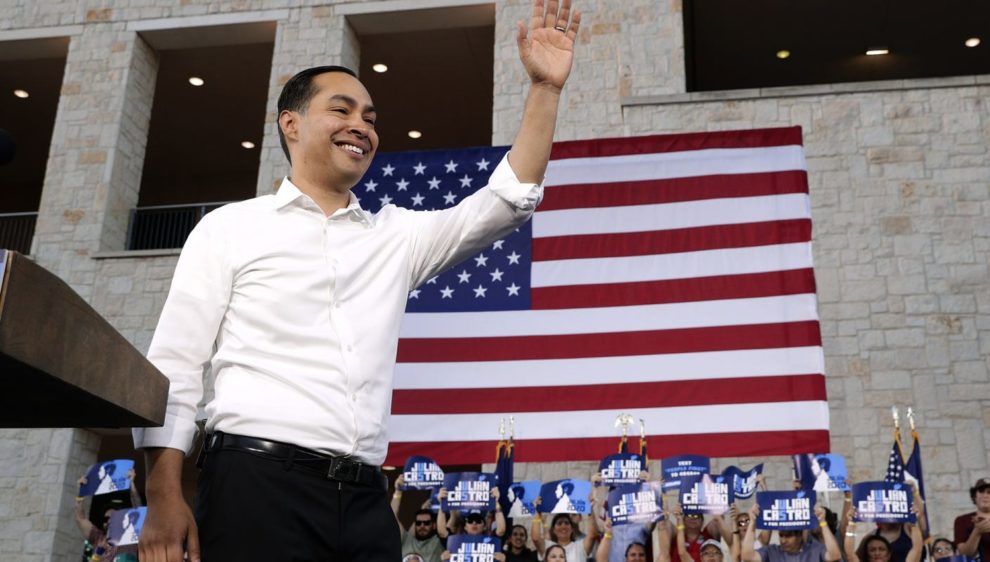In 2017 I was set to graduate with a master’s in public policy from USC, and my classmates were psyched about the commencement speaker. No, they weren’t hyped about Will Ferrell, who was set to give the address for the entire student body. Instead, my policy friends mostly skipped Ferrell’s address and waited for Julián Castro’s speech at the policy school’s commencement ceremony.
Castro’s presence was especially meaningful for the Latino student body, as he was one of the few major policymakers who had a background similar to ours. We all knew he was going somewhere, and he did, although he’s now out of the presidential race. Latinos should be happy that he ran in the first place, but in the end we should rejoice that we didn’t get another centrist masquerading as a progressive.
A third-generation Mexican American, Castro was essentially the first Chicano Democrat to run for president (Bill Richardson doesn’t count). Raised by his grandmother and activist mother who played an active role in the Raza Unida Party, Castro’s story is one of quintessential American success, and inspiring to Latinos.
Castro also presented a unique picture of a Latino in the U.S. with visible indigenous roots, yet who is not an immigrant himself, something we don’t often see. In addition to his unique status as a Chicano on such a large stage, he had some notable policy proposals that were aggressively progressive. One of the most notable was his stance on decriminalizing border crossings.
This represented a bold stance considering the fact that if he won the primaries, he would have had to face off against the most xenophobic president in our lifetime. He also had innovative plans around policing and an inherited-wealth tax, taking us back to the days of the founders, who were fundamentally opposed to inherited wealth because it could lead to the ascension to power by the likes of people like Trump.
Castro not only displayed daring in some of his policies, but he remained unashamed of his lack of Spanish-speaking skills, having discussed the reality of so many Latinos who lose the language down the generational chain. Castro was perhaps the most American of candidates in this regard.
And yet, Castro never came close to being a front runner, finding himself off of the debate stage in December due to his low polling numbers. He blamed this status on the DNC raising their thresholds, and he bemoaned the primary process in general, asking the question that we’ve all asked at some point—“What’s Iowa?”
Castro diverged from the ranks of most candidates in proposing that the primary calendar be altered so that states like California, with more minority voters, can be more represented in the primary.
No other candidates raised this sort of issue. In doing so, he struck at the heart of the malaise and disaffection that so many Latinos feel when election season comes around. We are often forgotten, because this country implicitly places more emphasis on voters from Iowa and New Hampshire than voters in more populous areas, areas of which just so happen to be home to a bevy of Latinos.
Castro was thus the primary’s chief hype man for Latino and even black interests on the national stage. But a hype man does not necessarily make a good president, and a more detailed look at some of his policy positions indicate that, beyond his positions on immigration and police reform, he likely would have followed the centrist lead of the great-minority hope that was President Obama.
When Hillary Clinton was considering Castro for a VP run (before she picked the human taxidermy that was Tim Kaine), progressive groups excoriated Castro for his offloading of mortgages to Wall Street firms as HUD Secretary.
But before that, as mayor of San Antonio, he displayed the ease with which he is able to sacrifice progressive ideals for political expedience, as he initially opposed a big development deal as a councilmember but then, not wanting to anger powerful developers as he ran for mayor, he did an about-face and supported it.
As mayor, he governed with the stable hand of your typical centrist who has to exist in a Texas politics ruled by the oil elite, using these oil companies and the arms industry as the foundation for an economic-development plan, as Jacobin reported, while continuing to focus on the zero-sum game of subsidies and giveaways to lure industry to San Antonio. In the end, the city faced a budget shortfall, and Castro ushered in a wave of austerity.
Castro is not a monster, of course. Like many, he started out idealistic, and when confronted by political realities, he had difficult decisions to make. It just so happens that those decisions were not in the interests of his Latino constituents in San Antonio, or of working-class constituents in the broader United States.
Whatever his “woke” credentials were, his policy actions regarding economic and environmental power proved that he was always too willing to make tradeoffs that would pay off for his career.
I don’t blame him for this. Our political system offers incentives that are opposed to the broader interest, which is why we need systemic change over and above hoping for a great savior as president. We should all be thankful that he came this far in the presidential primary, because we need more of us on that stage. Let’s hope we can create a system that doesn’t force promising men like Castro to make ugly choices.
Adiós Julián.












